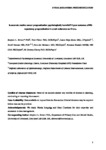Is accurate routine cancer prognostication psychologically harmful? 5-year outcomes of life expectancy prognostication in uveal melanoma survivors
| dc.contributor.author | Brown, SL | en |
| dc.contributor.author | Fisher, P | en |
| dc.contributor.author | Hope-Stone, L | en |
| dc.contributor.author | Damato, B | en |
| dc.contributor.author | Heimann, H | en |
| dc.contributor.author | Hussain, R | en |
| dc.contributor.author | Cherry, MG | en |
| dc.date.accessioned | 2022-01-25T12:40:17Z | |
| dc.date.issued | 2021-04-19 | en |
| dc.identifier.issn | 1932-2259 | en |
| dc.identifier.uri | http://hdl.handle.net/10026.1/18616 | |
| dc.description.abstract |
<jats:title>Abstract</jats:title><jats:sec> <jats:title>Purpose</jats:title> <jats:p>Prognostication in cancer is growing in importance as increasingly accurate tools are developed. Prognostic accuracy intensifies ethical concerns that a poor prognosis could be psychologically harmful to survivors. Uveal melanoma (UM) prognostication allows survivors to be reliably told that life expectancy is either normal (good prognosis) or severely curtailed because of metastatic disease (poor prognosis). Treatment cannot change life expectancy. To identify whether prognosis is associated with psychological harm, we compared harm in UM survivors with good and poor prognoses and those who declined testing and compared these outcomes to general population norms.</jats:p> </jats:sec><jats:sec> <jats:title>Methods</jats:title> <jats:p>Non-randomized 5-year study of a consecutive series of 708 UM survivors (51.6% male, mean age 69.03, <jats:italic>SD</jats:italic>=12.12) with observations at 6, 12, 24, 36, 48 and 60 months. We operationalized psychological harm as anxiety and depression symptoms, worry about cancer recurrence (WREC) and poor quality of life (QoL).</jats:p> </jats:sec><jats:sec> <jats:title>Results</jats:title> <jats:p>Compared to other groups, survivors with poor prognoses showed initially elevated anxiety and depression and consistently elevated worry about local or distant recurrence over 5 years. Good prognoses were not associated with outcomes. Generally, no prognostic groups reported anxiety, depression and WREC or QoL scores that exceeded general population norms.</jats:p> </jats:sec><jats:sec> <jats:title>Conclusions</jats:title> <jats:p>Using a large sample, we found that harm accruing from a poor prognosis was statistically significant over 5 years, but did not exceed general non-cancer population norms.</jats:p> </jats:sec><jats:sec> <jats:title>Implications for Cancer Survivors</jats:title> <jats:p>Survivors desire prognostic information. At a population level, we do not believe that our findings show sufficiently strong links between prognostication outcome and psychological harm to deny patients the option of knowing their prognosis. Nonetheless, it is important that patients are informed of potential adverse psychological consequences of a poor prognosis.</jats:p> </jats:sec> | en |
| dc.language | en | en |
| dc.language.iso | en | en |
| dc.publisher | Springer Science and Business Media LLC | en |
| dc.title | Is accurate routine cancer prognostication psychologically harmful? 5-year outcomes of life expectancy prognostication in uveal melanoma survivors | en |
| dc.type | Journal Article | |
| plymouth.journal | Journal of Cancer Survivorship | en |
| dc.identifier.doi | 10.1007/s11764-021-01036-4 | en |
| plymouth.organisational-group | /Plymouth | |
| plymouth.organisational-group | /Plymouth/Faculty of Health | |
| plymouth.organisational-group | /Plymouth/Faculty of Health/School of Psychology | |
| plymouth.organisational-group | /Plymouth/Users by role | |
| plymouth.organisational-group | /Plymouth/Users by role/Academics | |
| dcterms.dateAccepted | 2021-03-26 | en |
| dc.rights.embargodate | 2022-01-27 | en |
| dc.identifier.eissn | 1932-2267 | en |
| dc.rights.embargoperiod | Not known | en |
| rioxxterms.versionofrecord | 10.1007/s11764-021-01036-4 | en |
| rioxxterms.licenseref.uri | http://www.rioxx.net/licenses/all-rights-reserved | en |
| rioxxterms.licenseref.startdate | 2021-04-19 | en |
| rioxxterms.type | Journal Article/Review | en |


